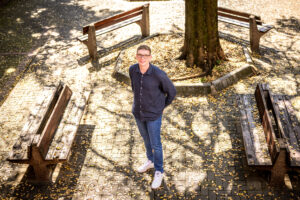.
Jarrod Bubb, a recent MScAgric graduate in Plant Pathology from the University of Pretoria’s Department of Plant and Soil Sciences, is contributing to an emerging area of food security through the lens of microbiology. His work was conducted under the supervision of Dr Jarishma K. Gokul and co-supervision of Prof. Lise Korsten, co-director of the CoE-FS. Bubb’s study explored the fungal ecology of Sclerocarya birrea, more commonly known as marula fruit, an iconic indigenous Southern Africa species. His research offers valuable insights into postharvest spoilage and microbial interactions, with implications that stretch from rural community livelihoods to sustainable agriculture.

Photo by EYEscape
From Curiosity to Specialisation
Jarrod’s academic journey began with a general interest in Biological Sciences. Initially unsure of his career direction, he was drawn to the intricate worlds of microbiology and genetics during his undergraduate studies. A growing fascination with microbial life and its role in plant health naturally led him to specialize in Plant Pathology.
“I found myself intrigued by how microbes interact with plants, both in disease development and in building resilience.”
After completing an Honours project focused on using UV-C light to manage postharvest disease in avocado, Bubb shifted his focus to a less-studied, yet culturally significant crop: marula. The fruit’s nutritional, economic, and cultural relevance in Southern Africa made it an ideal subject for research with both scientific depth and real-world applicability.

Photo by: EYEscape
Innovation and Traditional Knowledge
What makes Jarrod’s work unique is that he used both traditional lab techniques and modern DNA-based tools to study the types of fungi found on marula fruit.
“This dual approach allowed us not only to isolate and identify cultivable pathogens but also to uncover the hidden fungal community dynamics that could influence fruit quality.”
The research showed clear differences in the types of microbes found on fruit from two different marula trees. Fruit from Tree 2 had more harmful fungi and was more rotten, while fruit from Tree 1 seemed healthier and better protected. This suggests that some trees may have a natural balance of microbes or resistance that helps reduce spoilage after harvest.
Among the most surprising discoveries were fungal types that hadn’t been recorded on marula before, including some that might actually help protect the fruit. The types of fungi also changed a lot between unripe and ripe fruit, showing that ripeness plays a big role in which microbes are present.

Photo by: EYEscape
Protecting Harvests, Empowering Communities
Jarrod’s research carries far-reaching implications. By identifying key fungal agents of spoilage and tracking their progression through the fruit’s ripening cycle, his work contributes to strategies aimed at reducing postharvest losses, an urgent issue in food security, particularly in regions where indigenous crops remain under-researched. Reflecting on this Jarred says the following:
“Enhancing the value chain of fruits like marula can contribute to rural development, support biodiversity, and create opportunities for income generation.”
His work aligns closely with the CoE-FS’s mission to promote sustainable, inclusive food systems through evidence-based research, support for indigenous foods, and agroecological innovation.

Looking Ahead
Moving out of academia Jarred is aiming for a career that blends scientific research with real-world impact. He is particularly interested in project management, agricultural innovation, and sustainability development.
Whether through digital agriculture, sustainable farming implementation, or reducing postharvest loss, Jarred is committed to building a resilient food future. He looks forward to a path rooted in indigenous knowledge while embracing modern science.
related Articles
A Community of Practice grapples with the complexities of local wild indigenous...
The Greater Cape Floristic Region (GCFR) is a global biodiversity hotspot threatened by agriculture and urbanisation, holding an estimated 1,700…
UKUDLA: Call for Master’s Scholarship Applications Cohort 2, 2025
The African-German Centre for Sustainable and Resilient Food Systems and Applied Agricultural and Food Data Science (UKUDLA) invites applications…



